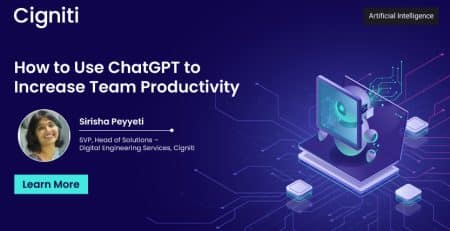The AI Advantage: How Retailers are Winning with Intelligent Technology
|
Listen on the go!
|
The Nvidia study found that AI has already been a game-changer for retailers, with 69% reporting an increase in annual revenue attributed to AI adoption and 72% of retailers that already use AI saying they experienced a decrease in operating costs.
According to recent reports, the global AI in the retail market is expected to reach $40.74 billion by 2030, witnessing a CAGR of 23.9% from 2022 to 2030. The increasing market size can be attributed to the increased digitization across the retail sector. To capitalize on this trend, retailers must intensify their efforts in digital transformation to deliver seamless experiences for customers and employees.
As retailers leverage AI to optimize operations, gain valuable customer insights, and personalize the shopping journey, they’ll boost customer satisfaction and loyalty and stay ahead of the competition in this ever-evolving landscape, leading to increased customer satisfaction and operational efficiency.
How will this Transformation Affect Retailers?
According to a Gartner report, nearly 50% of retail respondents employ AI technology daily. This transformation benefits retailers as follows:
Boosts Revenue and Efficiency: Imagine retailers like Macy’s using AI to predict demand for seasonal items like winter coats. This allows them to optimize inventory levels, preventing stockouts during peak season and reducing the need for deep discounts on unsold items later. Additionally, AI can automate tasks in the supply chain, like optimizing truck delivery routes, leading to significant cost savings.
Personalizes Customer Journey: Imagine walking into a store and being greeted by a virtual assistant who recognizes you and recommends items based on your purchases and browsing history. This personalized touch fosters customer satisfaction and can lead to impulse purchases or unplanned “add-ons” to your shopping list.
Data-Driven Decisions: AI can analyze vast amounts of data, like customer demographics and purchase history, to identify trends and predict customer behavior. This empowers retailers to make informed decisions about product offerings, marketing campaigns, and store layout, ultimately improving overall effectiveness.
Empowers Employees: AI can automate tedious tasks like data entry, order processing, and basic customer service inquiries. This frees up employees like sales associates to focus on building customer relationships, offering product recommendations, and providing personalized service, maximizing human potential in areas where AI cannot replicate human connection.
The Impact on Consumers
For consumers, the impact of AI in retail will be a double-edged sword, offering both opportunities and challenges:
Opportunities:
- Personalized Experiences:AI-powered recommendations, promotions, and marketing messages tailored to individual preferences will lead to a more relevant and enjoyable shopping experience.
- Improved Product Discovery:AR/VR technology powered by AI could allow for virtual product visualization, enabling consumers to try on clothes, see furniture in their homes, or explore products in more detail.
- Potentially Lower Prices:Optimized supply chains and efficient operations driven by AI could lead to reduced costs for retailers, potentially translating into lower prices for consumers in some cases.
Challenges:
- Privacy Concerns: Customer privacy is a growing concern with AI-powered personalization. Many customers appreciate the convenience but feel uneasy about the extent of data collection used for recommendations and targeted marketing.
- Potential Bias:AI algorithms can perpetuate existing biases if not carefully designed and monitored, potentially leading to unfair or discriminatory practices towards certain groups of consumers.
- Loss of Human Connection:Due to their increased reliance on automation, some consumers might experience a less personalized and human-centric shopping experience.
Preparing Retailers for AI’s Impact
The retail industry is gearing up for the AI revolution, and preparing for its impact is crucial for success. Here are some key strategies retailers can adopt:
Initial Investment Hurdle: Implementing AI solutions can be costly, requiring investment in technology, infrastructure, and specialized talent with the necessary expertise in data science and machine learning. This might be a barrier for smaller retailers struggling to compete with larger companies with more significant resources.
Prioritizing Responsible AI: Implement ethical practices by testing and monitoring AI algorithms for bias and taking steps to mitigate any potential discriminatory outcomes. Build customer trust by demonstrating a solid commitment to responsible data practices and ethical AI development.
Embracing Collaboration: Partner with AI experts and technology providers to gain access to the expertise and resources needed for successful implementation. Look for partners with proven experience in the retail sector.
Equipping IT Leaders and Management Colleagues for the Transformation
Building a Shared Vision and Understanding: IT leaders can present clear, concise information about AI’s potential impact on the retail landscape. Translate AI’s potential into tangible business goals, like projected revenue growth or cost reduction percentages. This helps management understand the return on investment (ROI) for AI initiatives.
Collaborative Strategy & Roadmap Development: Work with management to identify key areas where AI can add the most value. Create a phased roadmap for AI implementation, prioritizing areas with the highest potential impact and lowest complexity. This allows for controlled rollouts, learning from each phase before scaling further.
Communication & Transparency: Keep management informed about progress, challenges, and learnings throughout the AI implementation process. Be upfront about the timeframes and resources required for successful AI implementation. AI is a marathon, not a sprint.
Building IT Capabilities: IT leaders should evaluate the current infrastructure’s capacity to handle AI workloads. Depending on existing capabilities, this might involve upgrades or cloud migration. Recruit or train IT staff with the necessary skills to develop, deploy, and maintain AI solutions. Consider partnering with external AI specialists if needed.
Fostering a Culture of Learning and Experimentation: Train all relevant personnel, not just IT staff, on the basics of AI and its potential impact on their roles. Create an environment where controlled experimentation with AI is encouraged. This allows for exploring new possibilities and identifying unforeseen challenges.
Conclusion
The integration of AI in the retail sector is revolutionizing the industry, driving significant increases in revenue and efficiency while enhancing the customer experience. As retailers harness the power of AI to optimize operations, personalize interactions, and make data-driven decisions, they position themselves for sustained growth and competitive advantage. However, this transformation also presents challenges, such as privacy concerns and the need for ethical AI practices.
By embracing digital transformation and responsible AI implementation, retailers can navigate these challenges and capitalize on AI’s immense opportunities, ensuring a prosperous future in an ever-evolving landscape.
Cigniti’s expertise in Retail Testing, enhanced with AI-driven insights, empowers multi-channel retailers to transform their businesses with a quality-focused, results-driven strategy. Leveraging unbiased quality engineering, customized testing frameworks, and deep domain expertise, our AI-enhanced end-to-end testing processes ensure quality across enterprise applications. We support individual and large chain retailers in enterprise re-platforming, upgrades, migrations, and integrating CRM, OMS, WMS, Cloud, Mobile, and Web apps.
Need help? Contact our AI and retail experts to learn more about AI’s advantages and how retailers are winning with this intelligent technology.





Leave a Reply